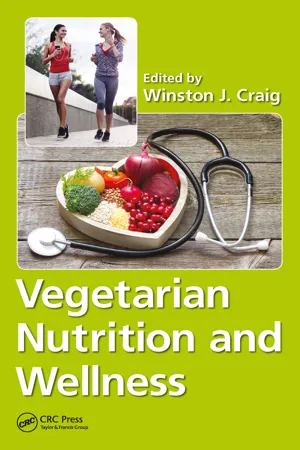
- 332 pages
- English
- ePUB (mobile friendly)
- Available on iOS & Android
Vegetarian Nutrition and Wellness
About this book
A large amount of research effort goes into assessing the health benefits of a plant-based diet, resulting from human desire to consume a more sustainable diet that is less destructive of the earth's natural resources. In addition, a growing number of people are choosing the vegan or total vegetarian diet because of the potential to greatly reduce the risk of chronic diseases and mortality rates. Although this interest in plant-based eating is popular, there exist concerns on the safety of some vegetarian diets, especially a vegan diet. This book describes issues of the vegetarian diet and outlines ways to prevent nutrient deficiencies.
Vegetarian Nutrition and Wellness focuses on synthesizing research around vegetarian diets and human health. A major section of the book deals with how a vegetarian diet protects population groups from the major chronic diseases, such as cardiovascular diseases, obesity, and various cancers. Based upon ecological and clinical studies, chapter authors explain the health-promoting properties of plant-based diets, and compare/contrast health outcomes obtained from consuming omnivorous diets with a vegetarian or vegan diet. Fruits and vegetables figure prominently in vegetarian diets and provide a substantial effect in disease reduction and health-promoting properties of a plant-based diet.
Vegetarian Nutrition and Wellness is written for the academic community, registered dietitians, health professionals, and graduate students in nutrition and public health. Each chapter provides a comprehensive review of the scientific literature and includes a concise summary at the beginning of each chapter. The time is ripe for this book to update the scientific community with a collage of well-documented topics on vegetarian nutrition.
Frequently asked questions
- Essential is ideal for learners and professionals who enjoy exploring a wide range of subjects. Access the Essential Library with 800,000+ trusted titles and best-sellers across business, personal growth, and the humanities. Includes unlimited reading time and Standard Read Aloud voice.
- Complete: Perfect for advanced learners and researchers needing full, unrestricted access. Unlock 1.4M+ books across hundreds of subjects, including academic and specialized titles. The Complete Plan also includes advanced features like Premium Read Aloud and Research Assistant.
Please note we cannot support devices running on iOS 13 and Android 7 or earlier. Learn more about using the app.
Information
Section IIPrevention of Chronic Diseases
4Vegetarian Diet and Risk of Cardiovascular Disease
Summary
4.1Introduction
Table of contents
- Cover
- Half Title Page
- Title Page
- Copyright Page
- Contents
- Introduction
- Editors
- Author
- Section IEnvironmental Issues
- Section IIPrevention of Chronic Diseases
- Section IIIPlant Proteins
- Section IVNutrient Profiles
- Section VVegetarian Issues in Ethnic Groups
- Section VIVegetarian Diets for Special Groups
- Index